Table of Contents
If you’re curious about how these little messages (app push notifications) can have a big impact on user engagement and app success, you’ve come to the right place. Get ready for a fun and informative journey that will demystify the world of push notifications and empower you with valuable insights.
Did you know that according to recent statistics, mobile users spend a significant amount of their time on apps?
In fact, the average person spends over four hours per day using mobile apps. With so much time invested, it’s crucial for app developers to keep users engaged and informed. And that’s where push notifications come into play!
In this blog, we’ll break down the concept of push notifications in a way that’s easy to understand, even for non-technical folks.
We’ll explore how these handy messages can enhance user experience, boost app retention rates, and drive user actions.
Get ready to uncover the secrets of effective push notification strategies that will captivate your audience and keep them coming back for more.
Join us on this adventure as we unlock the power of push notifications and discover how they can take your mobile app to new heights.
So, grab a cup of coffee, get comfy, and let’s dive into the world of push notifications together!
What is Mobile App Push Notification?
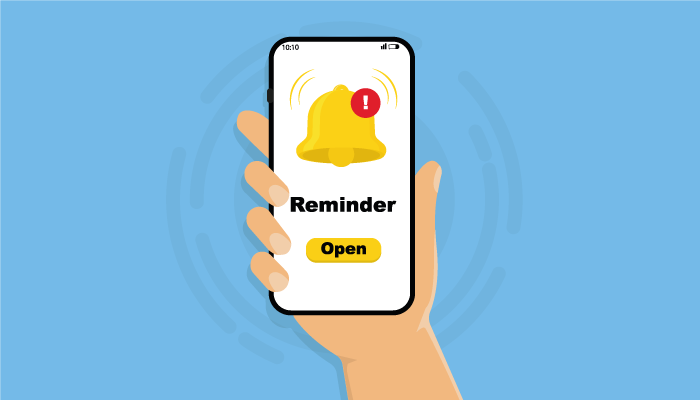
Mobile app push notifications are little messages that pop up on your phone screen, even when you’re not using the app. They’re like friendly reminders that keep you in the loop and make sure you don’t miss out on important updates, news, or exciting offers from your favorite apps.
Think of push notifications as your app’s way of tapping you on the shoulder and saying, “Hey, guess what? Something interesting is happening!”
They can be a fun way to stay connected with the apps you love and get personalized information right at your fingertips.
Imagine you’re a foodie, and you have a food delivery app installed.
With push notifications, you can receive mouthwatering offers and discounts, updates on your order status, or even a notification when your favorite restaurant adds a new dish to their menu. Yum!
Now, you might be wondering how push notifications work behind the scenes. Well, when you install an app, you usually grant it permission to send you these notifications. The app developers use special tools and technologies to send these messages to your device, and they can be customized based on your preferences and actions within the app.
It’s important to note that you have control over which notifications you receive. If you find a certain app is bombarding you with too many messages, you can always tweak the settings and choose which ones you want to receive or turn them off completely. Remember, you’re the boss of your phone!
Why Are App Push Notification Important?
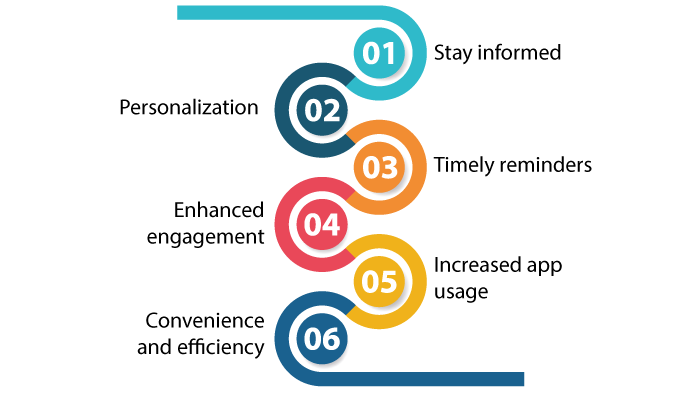
Push notification is an important part of mobile app development process for various reason. Let’s see what these reasons are.
These are, as mentioned below:
Stay informed
Push notifications keep you in the know, even when you’re not actively using an app. They bring important updates, news, and reminders directly to your phone screen.
Whether it’s a breaking news alert, a sale on your favorite online store, or a time-sensitive event, push notifications ensure you don’t miss out on anything important.
Personalization
Apps can use push notifications to deliver personalized content tailored to your interests and preferences.
By analyzing your app usage patterns and behaviours, they can send you relevant and targeted notifications.
This way, you receive information that is most likely to be useful and interesting to you.
Timely reminders
Have you ever forgotten to take a medication or missed an important appointment? Push notifications act as handy reminders to help you stay on track.
Moreover, they can remind you to complete tasks, make payments, attend meetings, or even wish you a happy birthday.
It’s like having a reliable digital assistant right in your pocket.
Enhanced engagement
App developers use push notifications to engage and interact with their users.
They can notify you about new features, updates, or exclusive content to keep you engaged with the app.
It’s a way for app creators to build a relationship with their users and make sure you keep coming back for more.
Increased app usage
By sending relevant and timely notifications, apps can encourage you to open them more frequently.
Whether it’s a tempting discount, a limited-time offer, or a personalized recommendation, push notifications can entice you to launch the app and explore what’s new.
It’s like a gentle nudge that keeps the app fresh in your mind.
Convenience and efficiency
Push notifications deliver information directly to your phone’s home screen, eliminating the need to manually check for updates within each app.
They save you time and effort by bringing important information to you, making your app experience more convenient and efficient.
And with this out of the way, it’s time to discuss the best push notification services.
Best App Push Notification Services
Whether you are going for product branding or just notifying audience of your on-demand app, push notification plays an important.
To enable that, you can use app push notification services. Let’s see what are some of the best picks in the market.
1. OneSignal
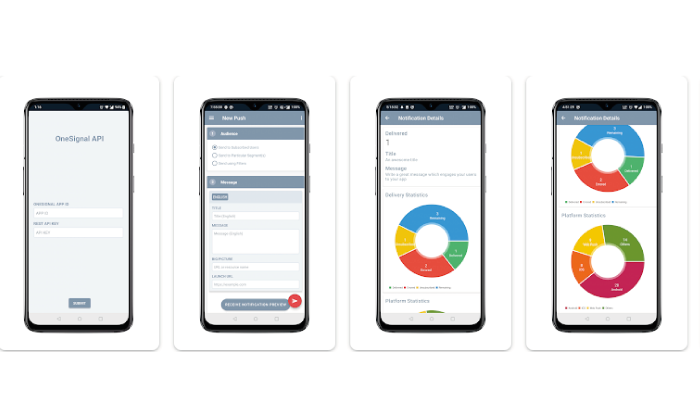
OneSignal is a popular push notification platform that is used by over 1 million developers. It offers a wide range of features, including:
- Segmentation: You can segment your users based on a variety of factors, such as location, device type, and app usage. This allows you to send more personalized and relevant notifications.
- Rich notifications: You can send notifications with images, videos, and other rich content. This can help to make your notifications more engaging and visually appealing.
- Analytics: OneSignal provides detailed analytics about your push notifications, such as open rates, click-through rates, and uninstall rates. This data can help you to improve the effectiveness of your campaigns.
- A/B testing: You can A/B test your push notifications to see what works best for your audience. This can help you to optimize your campaigns and get the best results.
- Automation: You can automate your push notifications so that they are sent at the right time and to the right people. This can help you to save time and effort, and to ensure that your notifications are always effective.
2. Google Firebase Cloud Messaging (FCM)
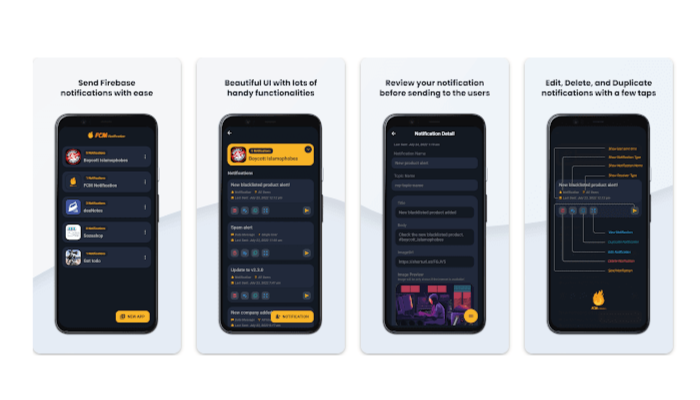
Google Firebase Cloud Messaging (FCM) is a push notification service that is offered by Google. It is a free service, and it is easy to integrate with your Android or iOS app.
FCM offers a basic set of features, but it is a reliable and scalable platform.
- Simple integration: FCM is easy to integrate with your app. You can use the FCM SDK to send push notifications to your users.
- Reliable delivery: FCM is a reliable platform for sending push notifications. Your notifications are delivered even if your users are offline.
- Scalable: FCM is a scalable platform that can handle large numbers of users. You can send push notifications to millions of users without any problems.
- Free: FCM is a free service. You can use it to send push notifications to your users without any cost.
3. Leanplum
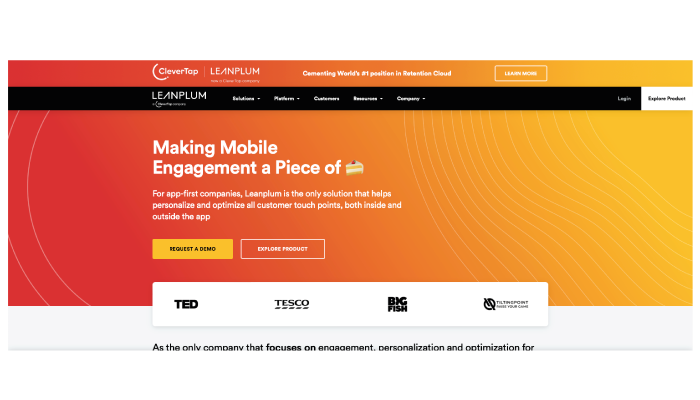
Leanplum is a push notification platform that focuses on behavioral targeting.
The platform uses machine learning to track user behavior and send notifications that are relevant to their interests. Leanplum also offers a variety of other features, such as A/B testing and segmentation.
- Behavioral targeting: Leanplum uses machine learning to track user behavior and send notifications that are relevant to their interests. This helps you to send more personalized and engaging notifications.
- A/B testing: You can A/B test your push notifications to see what works best for your audience. This helps you to optimize your campaigns and get the best results.
- Segmentation: You can segment your users based on a variety of factors, such as location, device type, and app usage. This allows you to send more personalized and relevant notifications.
- Analytics: Leanplum provides detailed analytics about your push notifications, such as open rates, click-through rates, and uninstall rates. This data can help you to improve the effectiveness of your campaigns.
4. Pushbots
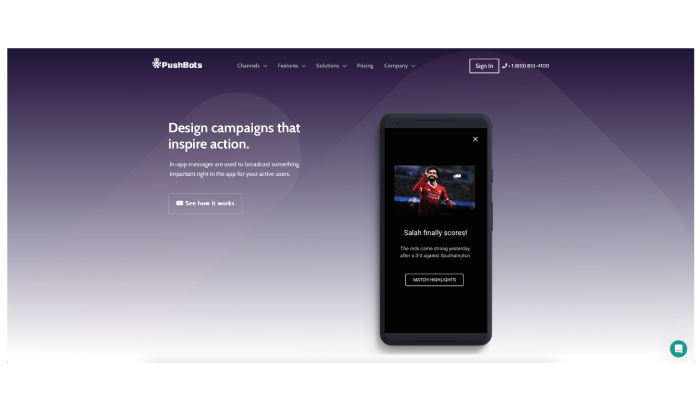
Pushbots is a push notification platform that is known for its ease of use. It offers a simple drag-and-drop interface that makes it easy to create and send push notifications.
In addition to this: Pushbots also offers a variety of features, such as segmentation and analytics.
- Easy to use: Pushbots is easy to use. You can create and send push notifications with just a few clicks.
- Drag-and-drop interface: Pushbots has a simple drag-and-drop interface that makes it easy to create and send push notifications.
- Segmentation: You can segment your users based on a variety of factors, such as location, device type, and app usage. This allows you to send more personalized and relevant notifications.
- Analytics: Pushbots provides detailed analytics about your push notifications, such as open rates, click-through rates, and uninstall rates. This data can help you to improve the effectiveness of your campaigns.
5. PushCrew
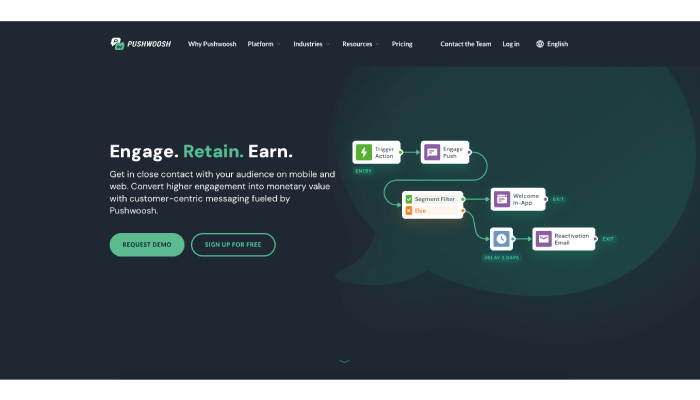
PushCrew is a push notification platform that is designed for small businesses.
It is easy to use and affordable. PushCrew offers a basic set of features, but it is a good option for businesses that are just getting started with push notifications.
- Easy to use: PushCrew is easy to use. You can create and send push notifications with just a few clicks.
- Affordable: PushCrew is affordable. You can get started with PushCrew for free, and there are paid plans that are available for businesses that need more features.
- Basic features: PushCrew offers a basic set of features, including segmentation, analytics, and A/B testing. This is a good option for businesses that are just getting.
6. Airship

Airship is a push notification platform that is used by large enterprises. It offers a wide range of features, including segmentation, analytics, and A/B testing.
Airship is a good option for businesses that need a powerful and scalable push notification platform.
- Powerful: Airship is a powerful platform that offers a wide range of features. This is a good option for businesses that need a platform that can handle large numbers of users and complex campaigns.
- Scalable: Airship is a scalable platform that can handle large numbers of users and complex campaigns. This is a good option for businesses that are expecting to grow their user base or that need to send push notifications to a large number of users.
- Enterprise–grade: Airship is an enterprise-grade platform that is designed for businesses that need a reliable and secure platform. This is a good option for businesses that are concerned about the security of their data.
7. Catapush
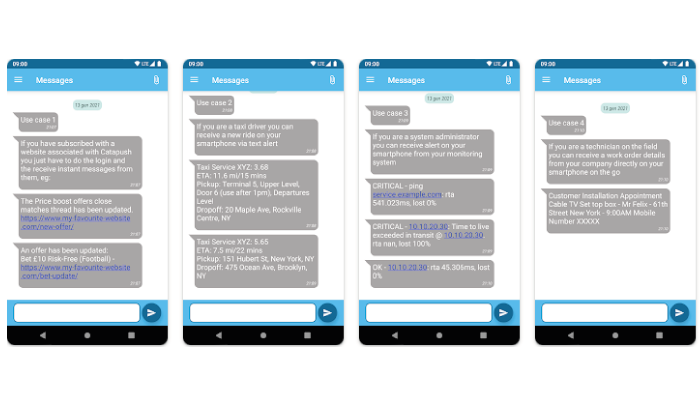
Catapush is a push notification platform that is designed for mobile games.
It offers a variety of features that are specifically tailored for game developers, such as push notifications that can be triggered by in-game events.
Catapush is a good option for businesses that develop mobile games.
- Game–specific features: Catapush offers a variety of features that are specifically tailored for game developers. This includes the ability to send push notifications that are triggered by in-game events, as well as the ability to track user progress and send notifications based on that progress.
- Reliable: Catapush is a reliable platform that is designed to handle the high volume of traffic that is generated by mobile games.
- Scalable: Catapush is a scalable platform that can handle the growth of your game and the increasing number of users.
8. iZooto
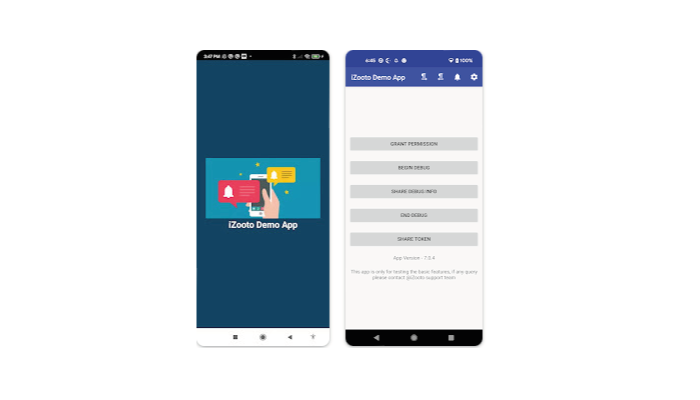
iZooto is a push notification platform that is known for its high deliverability rates. It offers a variety of features, such as segmentation, analytics, and A/B testing.
Moreover, iZooto is a good option for businesses that need a reliable and high-performing push notification platform.
- High deliverability: iZooto has high deliverability rates, which means that your notifications are more likely to reach your users.
- Reliable: iZooto is a reliable platform that is designed to deliver your notifications even if your users are offline.
- Feature-rich: iZooto offers a variety of features, including segmentation, analytics, and A/B testing. This allows you to create and send highly effective push notifications.
9. Braze
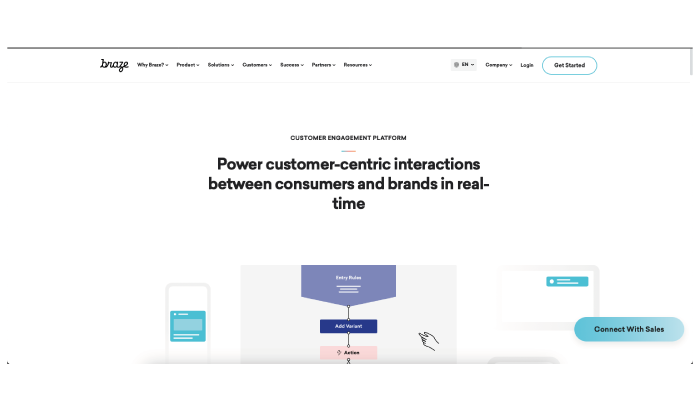
Braze is a push notification platform that is known for its deep integration with other marketing platforms. It offers a variety of features, such as segmentation, analytics, and A/B testing. Braze is a good option for businesses that want to integrate their push notification campaigns with other marketing channels.
- Deep integration: Braze offers deep integration with other marketing platforms, such as email, social media, and CRM. This allows you to create a holistic marketing strategy that includes push notifications.
- Feature-rich: Braze offers a variety of features, including segmentation, analytics, and A/B testing. This allows you to create and send highly effective push notifications.
- Scalable: Braze is a scalable platform that can handle the growth of your business and the increasing number of users.
And with this out of the way, it’s time to see how you can choose the best one out of these in te section below.
How To Choose Right Push Notification Service?
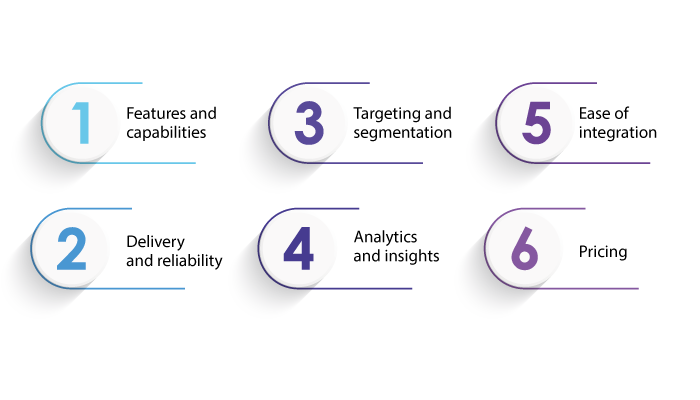
Going through these many push notification services can be confusing, that’s why we are here to help you.
These are some of the things that you can consider when selecting the right push notification service for your business.
· Features and capabilities
Look for a service that offers exciting features. You want customization options, like personalizing messages for your users.
Check if it allows you to target specific groups of users or schedule notifications in advance.
Oh, and don’t forget to see if it supports sending cool stuff like images or videos!
· Delivery and reliability
Imagine sending notifications that never reach your users.
No fun, right? So, go for a service with a reliable delivery track record.
Look for one that can handle a large number of users without delays or failures. You want notifications to reach your users’ screens like magic!
· Targeting and segmentation
Personalization is the name of the game! Find a service that lets you target specific groups of users. This way, you can send tailored messages to different audiences. It’s like speaking directly to your users, making them feel special and engaged.
· Analytics and insights
It’s all about understanding your users and improving your app’s performance.
Choose a push notification service that offers detailed analytics and insights. You’ll want to know things like open rates, click-through rates, and user engagement.
This data will help you refine your notification strategy and make informed decisions.
· Ease of integration
Nobody wants a complicated setup process, right? Look for a push notification service that integrates easily with your app.
Moreover, you don’t want to spend hours struggling with technicalities. Keep it simple, smooth, and hassle-free!
· Pricing
Last but not least, consider the pricing plans of different services. Some offer free plans with limited features, while others have paid options with additional perks.
Find one that fits your budget and offers the right balance of features for your needs.
Integrating Push Notification in Mobile App
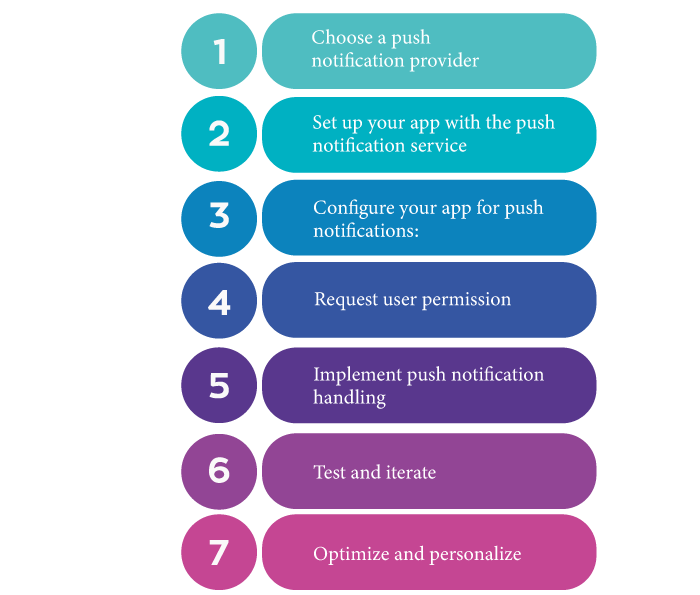
Now that you have selected the push notification service, it’s time to integrate it into the mobile app.
It’s recommended that you find an app developer for this, but knowing about the process doesn’t hurt either.
Therefore, let’s see how it works:
- Choose a push notification provider: Find a provider that fits your needs. Look for one with an easy-to-use interface and good support for iOS and Android platforms.
- Set up your app with the push notification service: Create an account and set up a new project for your app. This will give you the credentials to connect your app with the service.
- Configure your app for push notifications: In your app development environment, install the push notification SDK provided by your chosen provider. Follow their instructions to configure it within your app.
- Request user permission: When your app launches, ask users for permission to receive push notifications. Be clear about why you’re asking and highlight the benefits they’ll get.
- Implement push notification handling: Set up the logic in your app to handle received notifications. Register the user’s device token with the push notification service so it knows where to send the notifications. Decide what should happen when a user interacts with a notification, like opening a specific screen.
- Test and iterate: Test your integration thoroughly. Send test notifications to different devices and operating systems. Fix any issues or errors you find. Keep improving until everything works smoothly.
- Optimize and personalize: Use user data to send relevant notifications. Segment your users to send targeted messages. Experiment and analyze results to refine your notification strategy.
Conclusion
Mobile app push notifications are powerful tools that can significantly impact user engagement and app success. By delivering timely and personalized messages, they keep users informed, interested, and connected to their favorite apps. Remember, the key to successful push notifications lies in delivering valuable content while respecting users’ preferences.
FAQ
Mobile app push notifications are messages sent to users’ mobile devices by an application, even when the app is not actively in use. These notifications can appear as alerts, banners, or badges and serve to deliver important information, updates, reminders, or promotions.
Push notifications are delivered through a backend server to the user’s device using a unique device token or identifier. When the server sends a push notification, it reaches the user’s device and triggers a notification that is displayed to the user.
Push notifications are essential for mobile apps as they help engage and retain users by delivering timely and relevant information. They can increase user interaction, drive app usage, and provide valuable updates, promotions, or reminders, thereby enhancing the overall user experience.
Yes, users must give explicit permission to receive push notifications. When users install the app, they are prompted to allow or deny push notifications. It is crucial to respect user preferences and provide clear information about the benefits and frequency of push notifications to encourage opt-ins.
Yes, push notifications can be personalized based on user preferences, behavior, or demographics. By leveraging user data and segmentation techniques, app developers can send targeted notifications that are more relevant and tailored to individual users, increasing the likelihood of engagement and conversions.
To make the most of push notifications, it’s important to ensure they are timely, concise, and valuable to the user. Consider sending notifications for important updates, new features, personalized offers, or time-sensitive information. Also, segmenting users based on their interests or actions can help deliver more targeted and engaging notifications.
Yes, push notifications can be scheduled to be sent at specific times or triggered by specific events. This feature is particularly useful for time-sensitive offers, reminders, or news updates, allowing you to reach your users when they are most likely to engage with your app.
To measure the effectiveness of push notifications, you can track metrics such as open rates, click-through rates, conversions, and user retention. Analyzing these metrics can help you evaluate the impact of your notifications, refine your strategies, and optimize your push notification campaigns.
It’s important to strike a balance between engaging users and avoiding annoyance. To prevent overwhelming users with notifications, respect their preferences and provide options to customize the frequency or type of notifications they receive. Additionally, ensure that your notifications are relevant, valuable, and avoid being too frequent or intrusive.
Push notifications are supported on both iOS and Android devices. However, the implementation may vary slightly between platforms. It’s essential to follow the respective guidelines and best practices for each operating system to ensure optimal functionality and user experience.





No Comments
Comments are closed.